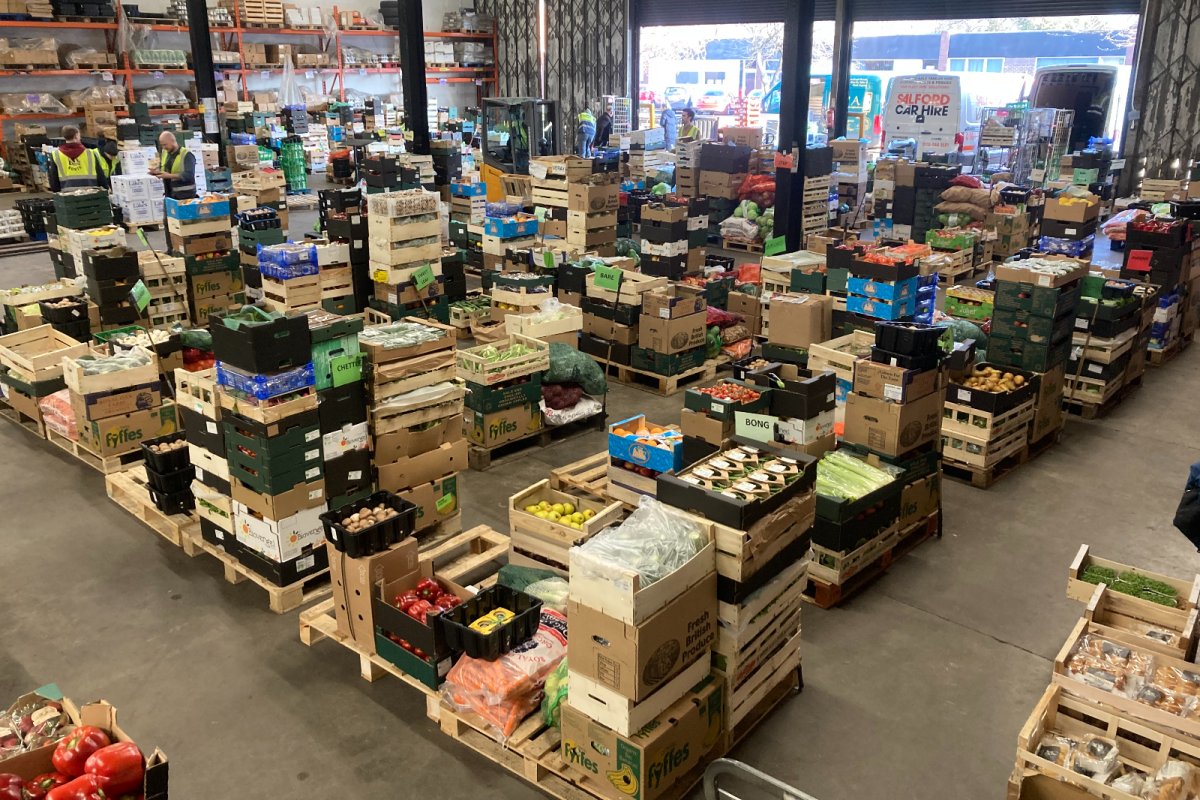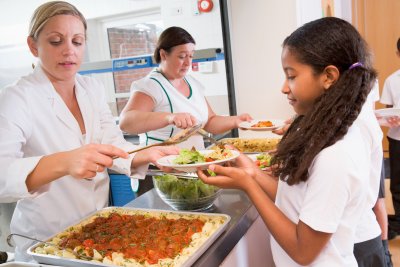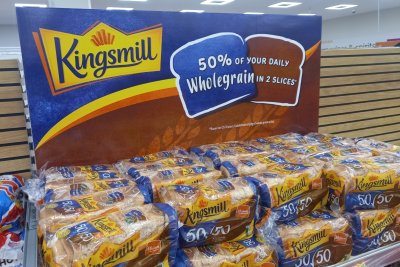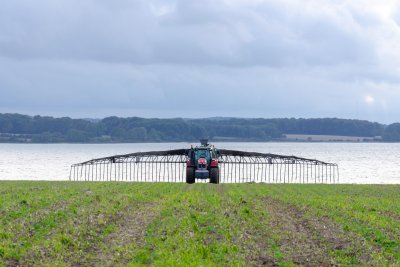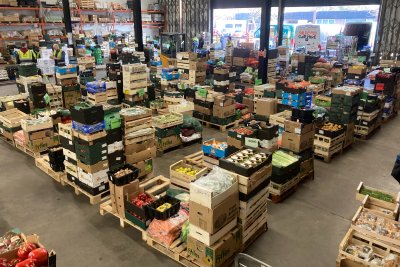 Organic North. Credit: Sustain
Organic North. Credit: Sustain
Bringing organic fruit and veg to the public sector: a Bridging the Gap learning exchange
How can we increase the supply of sustainably produced, organic fruit and veg into school meals and the public sector? Bridging the Gap brought together a group of practitioners, researchers and experts in supply chains in Manchester to find out.
Supplying fruit and vegetables to the public sector, such as school meals, remains one of the most effective ways to scale access to agroecological fruit and vegetables for everyone and provide the demand needed to kickstart a farming transition.
Over two days we visited a Royal Oak Farm, a large organic farm outside of Liverpool, and Organic North, an organic wholesaler in Manchester who are both looking to access public sector procurement contracts to understand where the challenges lie and where we already have some of the solutions.
Royal Oak farm, Ormskirk
The learning exchange kicked off with a group visit to Royal Oak Farm, an organic veg farm on 300 acres where Peter Lydiate and Cheryl Carruthers have been using organic methods since the late 1990s. As Cheryl says:
“You have to give back to the land”
After being subjected to harsh supermarket contracts, which left them worse off, Peter and Cheryl decided to start growing for veg box schemes, two restaurants and Organic North based out of Manchester, who is their biggest trader. The relationship with Organic North is non-contractual, instead built on trust, while the price is never negotiated, which allows the farm to plant their crops with confidence that there is a market for their product.
Royal Oak farm’s scale means they could already supply into public sector food contracts, especially given their on-farm equipment for washing and storing. The innovation on the farm is clear. Peter has built and adapted much of the machinery, including an impressive carrot washer and a machine to water the plants whilst they are becoming established in the nursery area. They also have a bespoke carrot harvester.
Organic North, Manchester
Next, the group took a tour of Organic North’s depot in the New Smithfield market. Organic North is the largest and longest-established wholesalers of certified organic produce in the north of England. Now in their 25th year of operation, with approximately 7 million in turnover, they supply over 260 customers (wholesalers, individuals, veg box schemes, retail and 1 school) with organic fruit, veg, dairy, eggs, bread, oils, ferments and dry goods. Their suppliers range from growing on ½ acre to 300, with the majority certified organic and some in conversion. There are 75 UK producers and a range of suppliers from Europe and further afield for the likes of bananas, turmeric, ginger and other items that are not grown in the UK. Although Organic North prioritises local, they find a heavy ideology on local makes things difficult and maintain a ‘more pragmatic approach’, with the aim to incrementally grow the local food system.
With the scale that Organic North are now trading at accessing public sector procurement contracts would provide a new secure market for their producers.
Sean Ruffell strongly believes that organic fruit and veg should be accessible to everyone, and not ‘the preserve of the privileged’.
Supplying into schools meals and using public money for public goods is one of the key ways to make agroecological fruit and veg accessible for all. Organic North has recently started supplying fruit and veg into a local high school. They would like to scale this income stream but they need to find the staff capacity for relationship development which is currently a time intensive element of this work.
Finding solutions
Finally the group came together at 5 Bridge Mill in Manchester to work through the challenges and opportunities for the supply of organic fruit and veg into the public sector and what the solutions look like. Exciting ideas included:
Pioneers
Collaborate with pioneers who are already making this happen, in local authorities, wholesalers, caterers and growers to share their stories and lessons.
Whole school approach
Advocate for a whole school approach that incorporates food education and a shift in attitude towards food in schools, e.g., longer lunches.
Storytellers
Engage storytellers to share impactful stories, case studies and guides. Including communication organisations, journalists, and youth voices. Run pilot/farm/school visits for MPs, local authorities, and school leaders.
Researchers
Gather data on job creation and getting people back to work related to a healthy local supply of fruit and vegetables into public sector food. Explore benefits and trade-offs in a transparent supply chain.
Policy people
Convene key organisations leading on policy, legislative, fiscal, and regulatory measures to encourage this supply chain. They would need to make the case to Treasury and develop relevant relationships with government and civil service.
Start local
Work with Food Partnerships via the SFP network to find local authorities open to change/innovation.
Guides/toolkits
Develop guides and/or toolkits on how to scale in this space
What next from Bridging the Gap
Bridging the Gap’s school food pilots in Scotland, Wales and England are demonstrating what ‘good’ looks like and how to scale the supply of agroecological fruit and veg in schools across the UK. Their full reports with economic analysis will be published in Autumn 2025.
Find out about the school food procurement pilots:
Thanks to the workshop attendees for their participation and contributions:
- Will White, Sustain
- Amber Wheeler, Welsh Veg in Schools
- Sean Ruffell, Organic North
- Danny Fisher, Growing Communities
- Sarah Duley, Soil Association Scotland
- Gareth Owen, Garden Organic
- Julie Brown, Growing Communities
- Sarah Gould, Lantra
- David Wylie, Menter Mon
- Alex Cook, Carmarthenshire County Council
- Charlie Jackson, Emfood
- Rowan Dumper-Pollard, Organic Research Centre
- Rosemary Venn, Centre for Agroecology, Water and Resilience
Bridging the Gap: Exploring ways to make organic food more accessible via farmer-focused supply chains.
Sustain
The Green House
244-254 Cambridge Heath Road
London E2 9DA
020 3559 6777
sustain@sustainweb.org
Sustain advocates food and agriculture policies and practices that enhance the health and welfare of people and animals, improve the working and living environment, promote equity and enrich society and culture.
© Sustain 2025
Registered charity (no. 1018643)
Data privacy & cookies
Icons by Icons8
